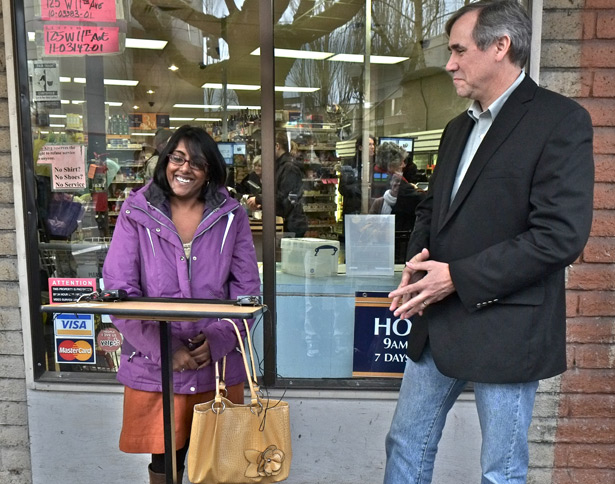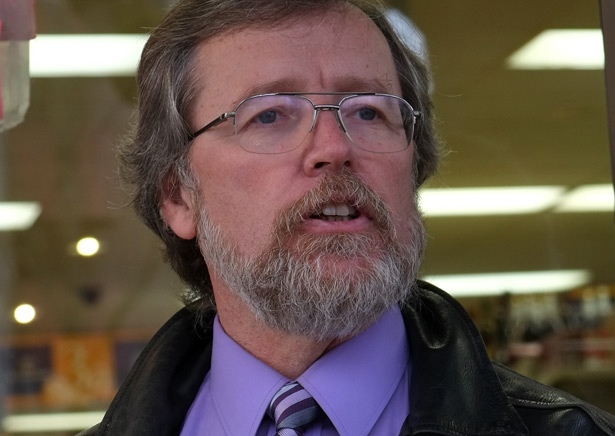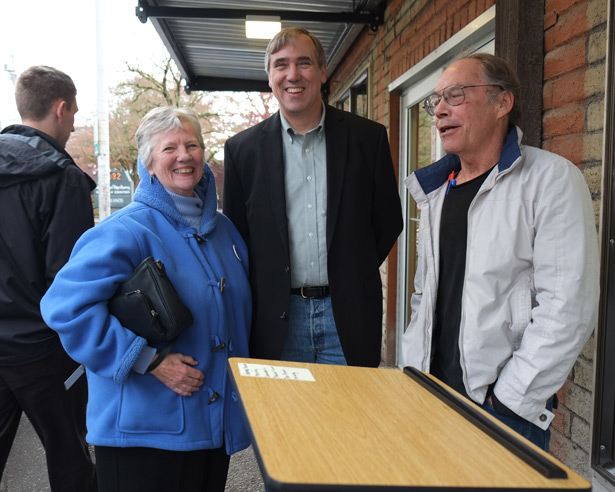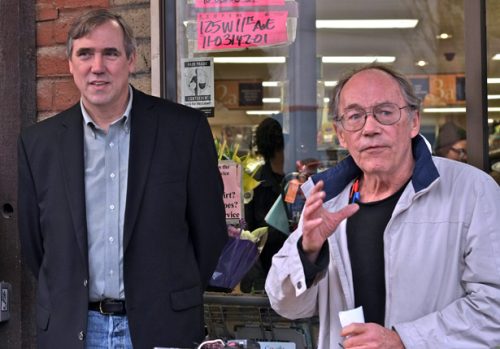
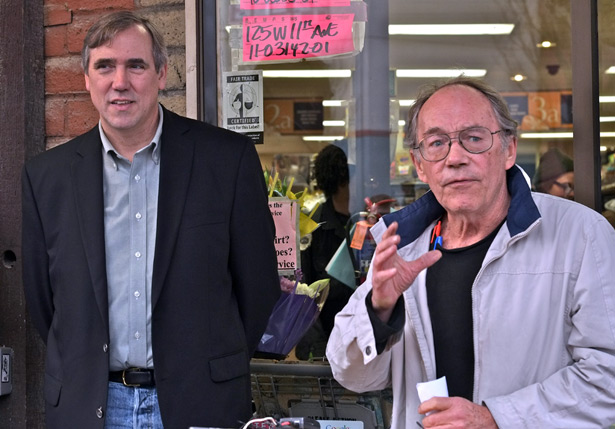 |
| George Brown introduces Jeff Merkley in front of the Kiva last Friday. Photo by Ted Taylor. |
Sen. Jeff Merkley surprised Eugene City Councilor George Brown by picking Brown’s The Kiva grocery store downtown to hold a press conference Jan. 10 about big national issues of fair wages and extending unemployment benefits.
Brown said the sidewalk press event wasn’t his idea, but he didn’t complain. Merkley praised Brown for his civic engagement and for three decades of progressive business management, including paying living wages and providing benefits.
Merkley usually draws a big audience but this event was announced only a few hours earlier due to concerns about his flight schedule. Few reporters showed up. Still, the sidewalk was crowded with supporters and puzzled grocery shoppers who found themselves squeezing awkwardly between cameras and one of the most powerful members of Congress.
“It’s not a surprise to anyone that families are struggling across America,” Merkley said. “Disparities in income are becoming even greater, with something like 95 percent of the growth in income across the country going to the top 1 percent. That leaves a very small fraction to be shared among everyone else.”
Merkley observed that when America’s wealthiest 1 percent have an issue, “legislative bodies can be quick to react.” But on issues that affect everyone else, “Congress doesn’t move so quickly.” He called on citizens to contact members of Congress and “turn up the heat.”
One of the biggest issues, he says, is the gap between rich and poor. He is co-sponsor of the Fair Minimum Wage Act, a bill backed by President Barack Obama that would raise, in three steps, the federal minimum wage from $7.25 to $10.10 an hour, plus an inflation index. Oregon’s minimum wage, second only to Washington state’s $9.32 an hour, went up to $9.10 on Jan. 1.
“Since 1968 the purchasing power of the minimum wage in America has not kept pace with inflation,” he said. “Purchasing power has dropped by 30 percent. A minimum wage would help a lot of families have a decent foundation, not a robust foundation, not an affluent foundation, but a foundation.”
Merkley said many families on minimum wage are living in poverty since the minimum wage nationally is only about $15,000 a year. His legislation would give 30 million American workers a raise. “That raise is going to be spent in the community, in the stores and retail outlets which can create jobs. It will certainly create more business. “
He dismissed the argument that the minimum wage is a “starter wage,” and said 88 percent of the women who work at minimum wage are adults. He introduced a young woman named Jhansie Turner who spoke briefly about her struggles to support her basic needs working minimum wage jobs. “I do know what it’s like to live from paycheck to paycheck,” she said. “It’s a struggle and you make a lot of sacrifices to your wellbeing and your quality of life.”
Joining the speakers was Tom Chamberlain, president of the Oregon AFL/CIO. “When we increase the minimum wage, we’re not just increasing it for those minimum-wage workers, but we have employers who pay a few cents or a few dollars more than the minimum wage,” Chamberlain said. “We’re creating jobs because when working folks actually have money in their pockets they spend it.”
Additional support came from Dan Bryant, senior minister at First Christian Church and co-chair of the public policy task force for Ecumenical Ministries of Oregon. Bryant noted strong support within the faith community for Merkley’s bill. “One of the core principles of the Gospel is economic justice for those who struggle in life, and we in the faith community often are working overtime to assist people when they are most in need.”
Bryant said that “receiving a fair wage, an adequate wage for one’s work is not only essential for the economy, it is essential for human dignity. We need this bill.”
Merkley also called for restoring food stamp benefits and extending unemployment benefits for three more months for people whose benefits ended Dec. 28. He said previous extensions of unemployment benefits began in the Bush administration as a bipartisan plan to keep the economy going during times of high unemployment. “We are at between 7 and 9 percent unemployment now,” Merkley said, “and if you go to some of the rural parts of Oregon, unemployment is still close to 12 percent. That makes it extraordinarily difficult to find a job.”
In photos below, Jhansie Turner talks about the struggles of living on minimum wage, Dan Bryant talks about the faith community’s support for boosting minimum wage, and longtime Eugene activist Ruth Duemler joins the conversation with Merkley and Brown.
